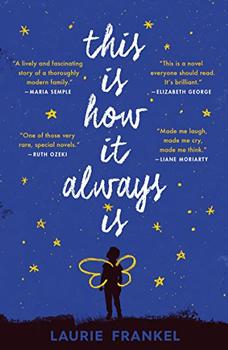Summary | Excerpt | Reading Guide | Reviews | Beyond the Book | Readalikes | Genres & Themes | Author Bio

Rosie nodded. It was all she could manage. But then Poppy's regular voice came back: "Where should we go on vacation?"
"When?"
"When I get out of here."
"I dunno." The only place they'd ever been on vacation so far was their grandparents' house, which smelled like basement. "Where do you want to go?"
"Siam," Poppy said immediately.
"Siam?"
"Like The King and I." The hospital had a poorly stocked video library of which that was the highlight. And Poppy had a lot of lying-around time.
"We'll go everywhere," Rosie promised. "As soon as you're out. Well, we probably have to wait four years till I get my license. Is Siam in driving distance?"
"I dunno. Probably." Poppy smiled happily. "You're such a good hair braider." It was the best thing about cancer it turned out. Poppy's wig hair was much longer and less tangled than her real hair. "Your daughter's going to be so lucky."
At that very moment, Rosalind Walsh, aged twelve, decided two things: her daughter would have long hair, like really long, like long enough to sit on, and she would name her Poppy. Eventually, Rosie discovered Siam was now called Thailand, but it was several lifetimes later before she got there, and then it was not for vacation. This was the last time she was ever alone with her sister.
All the way to the hospital, while Penn murmured, "Breathe, breathe," and Roo sang, "I gotta crow," and Ben and Rigel and Orion cawed back at the tops of their little boy voices, "Er-er-er-errrrr," Rosie whispered, "Poppy. Poppy. Poppy. Poppy."
Twenty minutes after they pulled up at the front door, the baby was ready.
"Push," said the doctor.
"Breathe," said Penn.
"Poppy," said Rosie. "Poppy. Poppy. Poppy."
Was that why? Was she just trying endlessly to make a daughter to fulfill an ancient dream of her sister's, a ten-year-old's dream at that? Did she believe this daughter would grow up and be, at ten, the little girl she'd lost, Poppy herself, picking up where Poppy had left off, fulfilling all the promise of that stymied, hacked-off, stubbed-out little life? As long as she kept her womb full, might Poppy, some version of Poppy—some waiting, watchful, wandering Poppy demon—gather up all her errant atoms and come home again? Was it creepy to imagine your dead sister taking up residence in your uterus? Wasn't it purported to be a sign of insanity to do the same thing over and over expecting different results?
One card short of a deck. One waffle short of a stack. One horse short of a … group of horses.
Or was it some long-bred, deep-sown conviction that the more children the better because you never knew when you might lose one? They had all been so broken when Poppy died, Rosie and her mom and dad. One was not enough. One was always out of balance. It was no longer two against two. There was no longer anyone to play with, to run to, to spare. Her mother, she knew, saw double, saw Poppy always at the edges, in Rosie's shadow, at Rosie's side during school plays and dances and graduation ceremonies, Poppy just behind Rosie and Penn at the wedding, Poppy panting quietly at Rosie's side while her babies were all being born. Even when Rosie's father left the world just before Roo came into it, her mother saw Poppy's ghostly outline alongside Rosie's swollen belly at graveside, quietly weeping for all that was lost, and it wasn't just their father. At least then, it was one against one again. Balance restored.
One is the loneliest number. Never put all your eggs in one basket.
So maybe that was why. Or maybe Rosie and Penn just liked babies, their promise and chaos and mess, the way babies all started the same and almost instantly became entirely different. Rosie loved the high-pitched pandemonium of her big, sprawling family, muddled love filling up their farmhouse-clubhouse, a cacophony only she could make out, a whirling storm with her and Penn, grinning together, spinning together, at the center.
Excerpted from This Is How It Always Is by Laurie Frankel. Copyright © 2017 by Laurie Frankel. Excerpted by permission of Flatiron Books. All rights reserved. No part of this excerpt may be reproduced or reprinted without permission in writing from the publisher.
Your guide toexceptional books
BookBrowse seeks out and recommends the best in contemporary fiction and nonfiction—books that not only engage and entertain but also deepen our understanding of ourselves and the world around us.